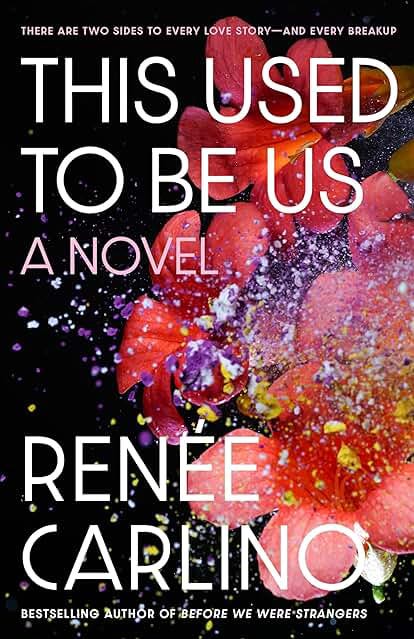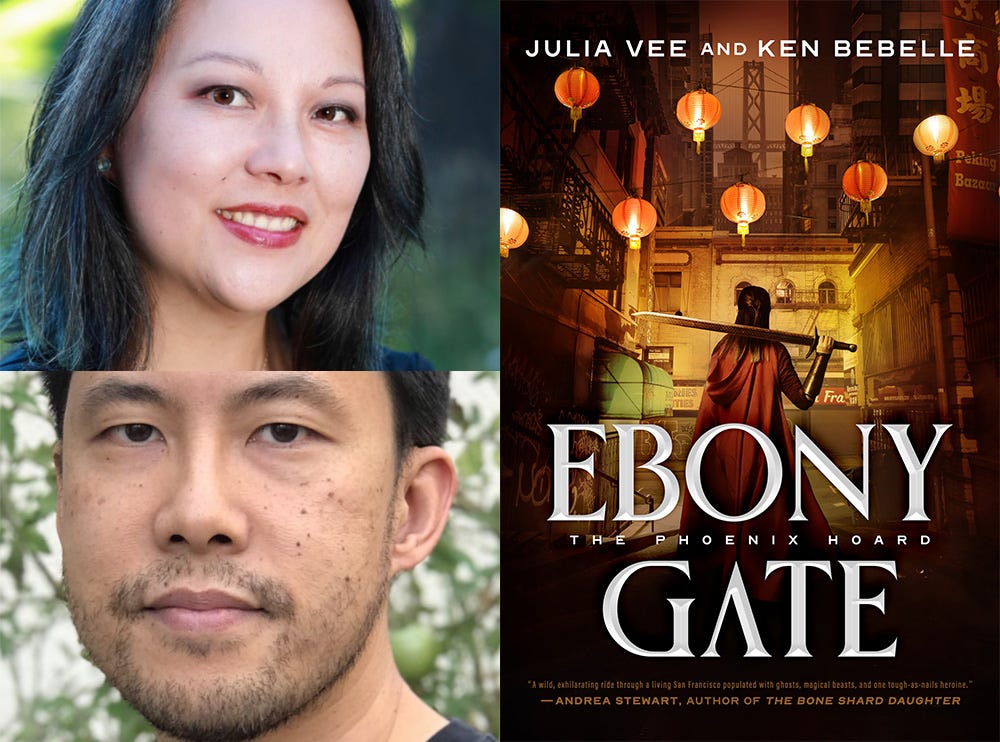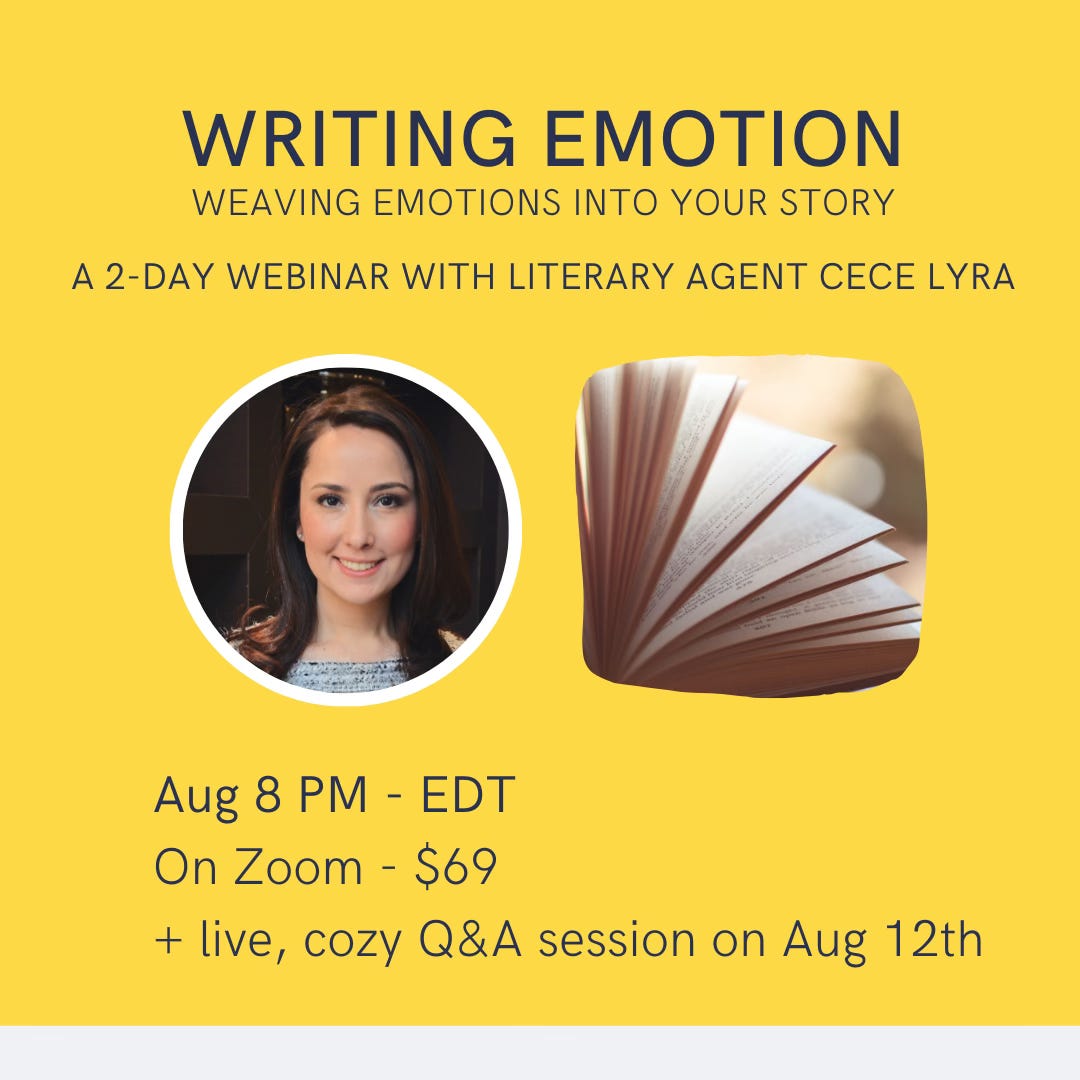Bestselling Author Renée Carlino on the Joy of Writing Without Following a Synopsis
Plus, the Query Lab, another unmissable course offering, and an intriguing essay by debut novelist Christine Ma-Kellams
Happy Friday, talented friends!
Before we dive into this week’s newsletter content, we wanted to take a moment to say thank you to everyone who reached out via comments, emails and social media shares to offer their thoughts on last Friday’s essay by guest contributor Carly Wahl. While we wish so many of you didn’t have to feel like it spoke to them, we’re gratified that we were able to provide a sense of “I’m not alone” for anyone who saw themselves in it. Aside from it being a common feeling, you are never alone as long as you have us. Always remember that your friends at The 💩 believe in you even when you don’t—it’s the reason we do this, after all. ❤️
On this week’s podcast, Carly gets to chat with her own client, Renée Carlino, about her latest novel, This Used to Be Us. In addition to espousing the joys of getting yourself into the zone and just writing, Renée shares her thoughts on writing what you enjoy and what makes you as a reader feel something, rather than what you think you’re “supposed to” write, as so often happens with aspiring authors. (Speaking of feelings…Don’t forget to check out CeCe’s course on writing emotion. Details below!)
We’ve also got another edition of the Query Lab and an essay from debut novelist Christine Ma-Kellams, in which she poses the question: Is there such a thing as “method writing”? (And also: if there is, does there need to be?) Don’t know what method writing is? We guess you’ll just have to read it to find out. 😉 (But here’s a hint: If you thought your browser search history was NSFW, you ain’t seen nothing yet…)
That’s all for now. Thanks for reading! ❤️
The Shit No One Tells You About Writing Team
P.S. Still not sure about upgrading to paid? Check out our Tuesday Teaser below to see what you’re missing!
This Week’s Podcast✨🎙️✨
In today's 📕Books with Hooks🪝, we’re throwing it back to an early backlist segment. After which, Carly interviews her very own client and bestselling author, Renée Carlino, to discuss her latest novel, This Used to Be Us. They chat about
Renée's journey to becoming a published author
How she found her first agent
What it's been like changing her focus and content over the course of her career
The joy of writing without a deadline or a synopsis to follow
Renée's experience having one of her older books go viral on TikTok
The premise behind Renée's latest
How she dials up the emotion in her novels; and
The movie adaptation of Wish You Were Here.
“I think for sure do not limit yourself. To just be free to write…where you're in a zone where by the end of the writing day, however many words you write, whether it's 500 or 5 ,000, you get that little…bit of high from it, right? Before anybody sees it, you have to really love that. And then I think...That's where you'll find momentum.”
— Renée Carlino
More information about Renée can be found on her website here. She is also on Instagram and X (formerly Twitter).
You can purchase This Used To Be Us on our Bookshop.org affiliate page here. Buying books through this link supports a local indie bookstore, as well as The Shit No One Tells You About Writing 📚❤️
You’ve Heard of “Method Acting” but is “Method Writing” a Thing?
By Christine Ma-Kellams
I don’t remember the first time I ever heard of “method acting,” but I do remember the most recent case it caught the public’s attention, mostly because it threatened to interfere with everyone’s favorite TV series, Succession. As a latecomer to the series, I spent most of its last and latest season catching up on the previous two before diving head first into the Roy family, whose escapades I found as compelling as my favorite books and more entertaining than most of the movies I had attempted to see, both in theaters and on Netflix. But then I caught wind of the famous New Yorker profile of Jeremy Strong, easily my favorite actor on the show, which was as unflattering as it was unexpected. Having been a longstanding New Yorker reader whose collection of their tote bags threatens to surpass the number of old issues I keep stuffed away in my closet, I was, quite frankly, surprised that the magazine could be so vindictive towards someone I admired so much. Usually, I find myself furiously nodding along with everything the New Yorker says. But then the profile of the Succession star came along, and its main complaint about the actor seemed to circle around one thing: his method acting. The piece itself also prompted debates all over Hollywood about whether this technique of trying to live as the fictional character one is playing even when the cameras aren’t rolling defeats the entire purpose of acting, which involves—presumably at its core—pretending to be someone you’re not.
Fast forward a year or so, and last month I found myself wondering whether the same existential question about methodology applied to writing. At an author panel hosted by indie booksellers, I met a fellow author whose book covers and plot summaries—like mine—suggest chick lit but whose sentences suggest lit fic. She had multiple novels in her review mirror and her latest took my breath away. In other words, she is the kind of author I admire and aspire to be like. Halfway through our interview questions, our moderator asked what kind of research we did for our respective novels. I waxed poetic about all the YouTube videos I watched for the writing of The Band: the James Cordon Carpool Karaoke with BTS episode that was my canon event, the American Hustle Life series Bangtan Sonyeondan did in my neck of the woods in LA, plus the endless stream of their music videos and Weverse Lives. Then it was this fellow author’s turn. She explained that she had to have a budget discussion with her hubby because she signed up for an actual OnlyFans account to write her book and paid to message multiple women monetizing that platform. She talked receiving automated photos of these content creator’s nether regions in response to said messages and trying to figure out the logistics of how these X-rated auto-replies were made possible. I sat there mesmerized and amazed. Was this literary version of method acting something writers did on the regular?
Upon further reflection, I suspected that this author was not alone. In my passing online conversations with other debuts, at least one has mentioned traveling to write their book. At the time, I automatically assumed that they meant they were doing some traveling anyway and just so happened to tie their book in with their itinerary. But maybe I underestimated.
I assume all writers close-read the acknowledgements sections of books—maybe for the gossip, or to beach-comb for personal details about the author’s life that could shed new light on their fiction, or to scavenge for names of editors and literary agents who share their taste. If I look back on all the acknowledgment sections I’ve read across all my favorite reads, I can recall that at least a handful spoke of going to similar lengths for their stories, most frequently in the form of talking to people who were the real-life equivalents of the characters in their books, or who would know something about them. So while research, broadly defined, isn’t anything new when it comes to storytelling, I suppose the part about method writing—akin to method acting—that got me was the cost involved in this very specific form of investigation. It’s one thing to look something up online or in a library or even via a live person you call up on the phone whose services are informal and free. It’s another thing to invest the kind of monied resources into doing something that requires a writer to re-do their monthly budget. “Method writing,” in other words, costs something—usually something substantial—in the same way that “method acting” has cost famous actors (including but not limited to Jeremy Strong) things too, whether it’s in the form of public opinion or quality time with cast mates or mental well-being during filming. This, in turn, raises the age-old question: how much are we willing to bleed for our art? Implicit to this is the related query of whether bleeding for our art, monetarily, mentally, or otherwise, is correlated with what we produce.
I ask these things because I don’t really know, but as a writer, have enough neuroses to wonder if I’ve been taking it too easy. After all, most of research starts and ends with what I can find online, supplemented only by what I can come up with in my head. Whether this is sufficient or advisable—well, I suppose only time can tell.
More information about Christine can be found on her website here. She also on Instagram and X (formerly Twitter).
You can purchase The Band on our Bookshop.org affiliate page here. Buying books through this link supports a local indie bookstore, as well as The Shit No One Tells You About Writing 📚❤️
The Query Lab 📝🖊
Welcome to The Query Lab where each Friday for the next few months we’ll be
sharing a successful query letter that got an author their agent AND their book deal.
Today we’ve got a query from Ken Bebelle and Julia Vee, authors of Ebony Gate: The Phoenix Hoard 😍:
Dear Ms. McLean,
When a death god comes to collect on a debt, you may end up paying with not just your life, but your afterlife, too.
Fed up with being her father’s hitman, Emiko hung up her katana and fled Tokyo for San Francisco. Hiding in plain sight with the working-class mages of Lotus Lane, she made a new life for herself away from her elite magical family.
When a demanding shinigami shows up to collect on an old blood debt, she must dust off her swords and become the Blade to protect her new adopted family. To save herself and her beloved city, she will need to recover the Ebony Gate and thwart the Cult of the Ninth Dragon.
Ebony Gate (80,000 words) is a fast paced Asian-themed urban fantasy novel centering on Emiko Soong, a retired assassin finding a place for herself in the magical Asian diaspora. The monsters and villains she encounters are drawn from Asian mythology. Although Ebony Gate can be read as a standalone adventure, we have outlines for further stories in the series wherein Emiko defines her own power and protects her loved ones from a cabal of mages seeking to unleash ancient powers better left alone.
The series will appeal to readers of Ilona Andrews’ Kate Daniels series, Fonda Lee’s Green Bone Saga, and Seanan McGuire’s October Daye series. Readers are hungry for a hero like Emiko.
As authors, the opportunity to use our own heritage and lore in a mainstream setting showcasing the exciting Asian cities we have explored is what drives our storytelling in Ebony Gate.
Sincerely,
Ken Bebelle and Julia Vee
You can learn more about Julia here and about Ken Bebelle here❤️
Ebony Gate: The Phoenix Gate is out now on our Bookshop.org affiliate page here. Buying books through this link supports a local indie bookstore, as well as The Shit No One Tells You About Writing 📚❤️🥰
Click below for the downloadable version of Julia and Ken’s successful query!
Tuesday teaser 😉
In next week’s newsletter exclusively for our paid members, Katherine Wood, whose Ladykiller is out Tuesday, shares insights into the book-to-screen adaptation process that only a screenwriter/director/producer turned novelist could offer. We’ve also got our weekly Q&A, this time featuring award-winning suspense author May Cobb who adds to the body of evidence supporting the assertion that it’s possible to achieve writing success in 15-minute increments; plus two more brand-new written critiques of queries from our listeners while recording of new Books with Hooks segments is on pause.
Not yet a member? For just $8USD a month or $80USD a year you get:
an exclusive newsletter on Tuesdays featuring bonus author Q&As and other exclusive content from industry experts
weekly access to Carly Watters and CeCe Lyra’s written notes on queries from the podcast’s Books With Hooks feature
monthly bonus podcast episodes, AND
regular Ask Me Anythings / Q&As with Carly, CeCe, and Bianca Marais.
If that doesn’t kickstart your writing journey, we don’t know what will!
It’s Time to Get Emotional with CeCe
What do all great stories have in common? They make us feel. Which is why the ability to weave emotion into a story is so important. Indeed, no matter the genre, being able to effectively convey a range of emotion will draw your readers in from the very start and compel them to read on.
The 3+ hour class covers various aspects of weaving emotions into your story, including:
Active vs. passive emotions;
How to effectively convey emotion (showing vs. telling);
Most common mistakes in writing emotion (and how to get it right);
Common challenges in writing emotions (and how to turn them into successes);
How to include emotion in your outline and synopsis;
Tips and tricks to effectively convey emotion;
The role of emotion in the query letter; and
The importance of emotional context the first 10 pages (or: How soon should I introduce emotion?).
PLUS we'll have a live, cozy Q&A session on Monday, August 12th at 8pm ET in which attendees will be able to turn on their camera (optional) and ask questions to CeCe.
If you cannot attend the live Q&A session, you are welcome to submit your questions during webinar on August 8th.
Writers of all categories and genres are invited to attend.
If you cannot attend live but wish to watch the webinar, please sign up as the recording will be emailed to you 24hr later. Recordings will be available to the viewer for one month.
Be Part of Carly’s Masterclass 😍📝
Carly’s class includes 10+ hours of writing and publishing video lessons you have lifetime access to, monthly Q&A sessions, and fresh content every quarter.
Did we mention there’s an app, too? You can keep learning on the go. Don’t miss a minute of Carly’s top career advice for aspiring, emerging and published writers. Get the writing career you’ve always dreamed of.
Bianca’s Great Beta Reader Match Up!
Are you looking for beta readers, some of whom might potentially become writing group members down the line?
Are you wanting to be matched up with those writing in a similar genre and/or time zone, so they can critique your work as you critique theirs at the same time?
Your manuscript doesn't have to be complete to sign up for this 3000-word review!
Registrations are open from now until July 31, with the match emails going out on August 1.
For more information and to register, click below!
That’s all for this week’s news! If you enjoyed it, why not share the love? 🥰
Tune in again next week for more invaluable wisdom from our wonderful hosts! Until then, happy writing! 😍
❤️ The Shit No One Tells You About Writing Team
Our work takes place on land now known as Toronto and Ottawa and we acknowledge that these are the traditional territories of the Mississaugas of the Credit, the Anishnabeg, the Chippewa, the Haudenosaunee, and the Wendat Peoples as well as the unceded, unsurrendered territory of the Anishinaabe Algonquin Nation. Toronto is covered under Treaty 13 and the Williams Treaties. We respect and affirm the inherent and Treaty Rights of all Indigenous Peoples across this land and acknowledge the historical oppression of lands, cultures, languages, and the original Peoples in what we now know as Canada. We invite you to learn more about the land you inhabit, the history of that land, and how to actively be part of a better future going forward together at Native Land or Whose Land.
Carly Watters and CeCe Lyra are literary agents at P.S. Literary Agency, but their work in this newsletter is not affiliated with the agency, and the views expressed by Carly and CeCe in this newsletter are solely that of themselves and do not necessarily reflect the views, opinions, policies, or position of P.S. Literary Agency.










